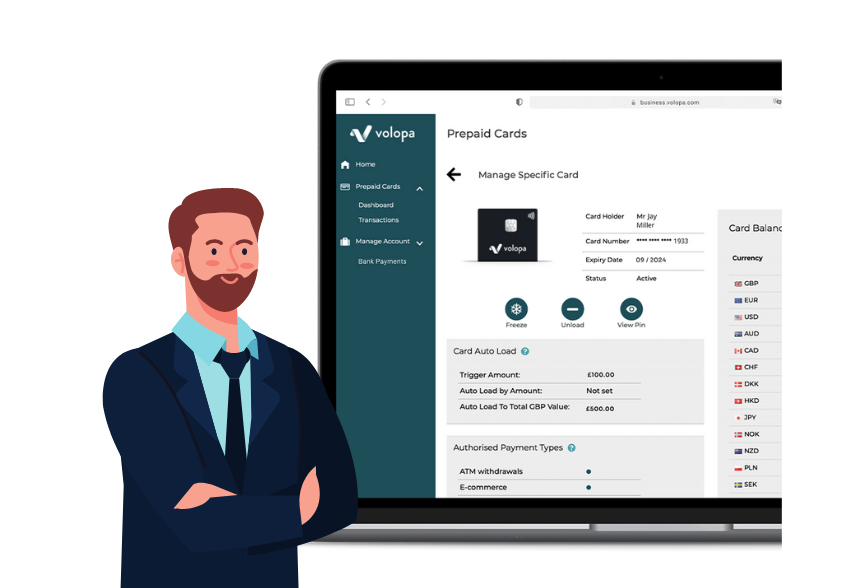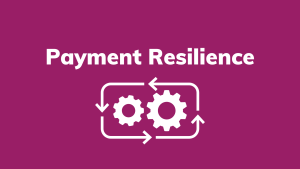Volopa news
Find out what is changing at Volopa

The story behind our rebrand
If you’ve been here before, you may have noticed that Volopa looks a little different. Over the last few months, we’ve been working on revamping our brand identity to take us into the next phase of delivering smarter, simpler, and more transparent payment solutions.
Our focus as a company has always been to deliver intuitive payment solutions for our clients. The rebrand gave us an opportunity to hone into our mission of helping modern-day businesses unlock their business potential through smarter payments solutions, and to put a spot a spotlight on our clients and the positive impact our technology has on their businesses.

What's changing?
From today and over the coming months, we’ll be bringing you updates on our new visual identity. You will notice that we’ve updated our website and branding on our social media platforms. We have also updated our blog and included a resources page that will become a hub for our blogs, guides, product updates, and more; packed with rich content designed for your finance operations, making it easier for you to find the information you need, get inspired and stay connected.
But we’re not done yet. We have some new and exciting features that we’ll be releasing soon including accounting integration, allowing you to sync your Volopa transactions directly into your accounting software of choice; a new platform interface for an improved user experience; a new app with additional expense management tools and much more. Keep an eye out on our blog for more announcements soon.
We are on a mission to continue building the right tools to enhance your daily tasks so you can focus on the work that counts. Join our community of businesses that are switching to our smarter payment solution.
Follow our journey on social media.
Find out more about what Volopa can do for you
Greater transparency
Visibility into what is being spent in real-time, gives you greater oversight on business decisions.
Greater Control
Regulate transaction types and purchase limits for each cardholder for greater control on your company spend.
Greater Efficiency
Power up your processes with one system that helps you consolidate payments and expenses for optimum efficiency.

Securing the best exchange rates
Generally speaking, both banks and payments providers charge a margin, typically via a commission or a percentage-spread, for converting currencies from the funding currency (what you send them) to the payment currency (what the recipient receives). Banks are traditionally risk averse to currency movements due to the size of the portfolio of client assets they hold in multiple currencies. Any shock movement within the currency market can amount to significant losses, and in a bid to mitigate this risk, banks tend to apply higher margins.
International payments providers generally take a different approach, utilising live rates which they transact with immediately. Using this methodology, they don’t need to hold on to funds, the risk is less, and margins can therefore be much lower amounting to better exchange rates for their clients.
Payment Speed
Just as a bank cheque takes time to deposit into an account, so does sending money from one country to another. International FX payments can often take days to reach your recipient if sent via your bank. This is because banks often use manual currency conversion processes and tend to send funds via costly legacy banking networks. If you wish to transfer funds quickly, banks may not be your best option.
Specialist payments providers have established “points-of-difference” in the international payments market through innovative solutions to enable same-day international payments using more robust platforms and security systems. Specialist payment providers tend to route international payments via newer alternative payment rails that are quick, low-cost and easy to track, meaning recipients receive their payments in full and on time, while payment initiators can stay up to date with their payment statuses.
Conclusion
Whilst a bank may provide familiarity, specialised payments providers can offer better FX and payments expertise, superior technology and more cost-effective exchange rates. Through the tailoring of solutions and streamlining compliance requirements, services provided are largely more client-centric and focused. This often amounts to lower fees and charges as well as a superior customer experience for their clients.
Volopa news
Find out what is changing at Volopa

The story behind our rebrand
If you’ve been here before, you may have noticed that Volopa looks a little different. Over the last few months, we’ve been working on revamping our brand identity to take us into the next phase of delivering smarter, simpler, and more transparent payment solutions.
Our focus as a company has always been to deliver intuitive payment solutions for our clients. The rebrand gave us an opportunity to hone into our mission of helping modern-day businesses unlock their business potential through smarter payments solutions, and to put a spot a spotlight on our clients and the positive impact our technology has on their businesses.

What's changing?
From today and over the coming months, we’ll be bringing you updates on our new visual identity. You will notice that we’ve updated our website and branding on our social media platforms. We have also updated our blog and included a resources page that will become a hub for our blogs, guides, product updates, and more; packed with rich content designed for your finance operations, making it easier for you to find the information you need, get inspired and stay connected.
But we’re not done yet. We have some new and exciting features that we’ll be releasing soon including accounting integration, allowing you to sync your Volopa transactions directly into your accounting software of choice; a new platform interface for an improved user experience; a new app with additional expense management tools and much more. Keep an eye out on our blog for more announcements soon.
We are on a mission to continue building the right tools to enhance your daily tasks so you can focus on the work that counts. Join our community of businesses that are switching to our smarter payment solution.
Follow our journey on social media.
Find out more about what Volopa can do for you
Greater transparency
Visibility into what is being spent in real-time, gives you greater oversight on business decisions.
Greater Control
Regulate transaction types and purchase limits for each cardholder for greater control on your company spend.
Greater Efficiency
Power up your processes with one system that helps you consolidate payments and expenses for optimum efficiency.

Securing the best exchange rates
Generally speaking, both banks and payments providers charge a margin, typically via a commission or a percentage-spread, for converting currencies from the funding currency (what you send them) to the payment currency (what the recipient receives). Banks are traditionally risk averse to currency movements due to the size of the portfolio of client assets they hold in multiple currencies. Any shock movement within the currency market can amount to significant losses, and in a bid to mitigate this risk, banks tend to apply higher margins.
International payments providers generally take a different approach, utilising live rates which they transact with immediately. Using this methodology, they don’t need to hold on to funds, the risk is less, and margins can therefore be much lower amounting to better exchange rates for their clients.
Payment Speed
Just as a bank cheque takes time to deposit into an account, so does sending money from one country to another. International FX payments can often take days to reach your recipient if sent via your bank. This is because banks often use manual currency conversion processes and tend to send funds via costly legacy banking networks. If you wish to transfer funds quickly, banks may not be your best option.
Specialist payments providers have established “points-of-difference” in the international payments market through innovative solutions to enable same-day international payments using more robust platforms and security systems. Specialist payment providers tend to route international payments via newer alternative payment rails that are quick, low-cost and easy to track, meaning recipients receive their payments in full and on time, while payment initiators can stay up to date with their payment statuses.
Conclusion
Whilst a bank may provide familiarity, specialised payments providers can offer better FX and payments expertise, superior technology and more cost-effective exchange rates. Through the tailoring of solutions and streamlining compliance requirements, services provided are largely more client-centric and focused. This often amounts to lower fees and charges as well as a superior customer experience for their clients.

Securing the best exchange rates
Generally speaking, both banks and payments providers charge a margin, typically via a commission or a percentage-spread, for converting currencies from the funding currency (what you send them) to the payment currency (what the recipient receives). Banks are traditionally risk averse to currency movements due to the size of the portfolio of client assets they hold in multiple currencies. Any shock movement within the currency market can amount to significant losses, and in a bid to mitigate this risk, banks tend to apply higher margins.
International payments providers generally take a different approach, utilising live rates which they transact with immediately. Using this methodology, they don’t need to hold on to funds, the risk is less, and margins can therefore be much lower amounting to better exchange rates for their clients.
Payment Speed
Just as a bank cheque takes time to deposit into an account, so does sending money from one country to another. International FX payments can often take days to reach your recipient if sent via your bank. This is because banks often use manual currency conversion processes and tend to send funds via costly legacy banking networks. If you wish to transfer funds quickly, banks may not be your best option.
Specialist payments providers have established “points-of-difference” in the international payments market through innovative solutions to enable same-day international payments using more robust platforms and security systems. Specialist payment providers tend to route international payments via newer alternative payment rails that are quick, low-cost and easy to track, meaning recipients receive their payments in full and on time, while payment initiators can stay up to date with their payment statuses.
Conclusion
Whilst a bank may provide familiarity, specialised payments providers can offer better FX and payments expertise, superior technology and more cost-effective exchange rates. Through the tailoring of solutions and streamlining compliance requirements, services provided are largely more client-centric and focused. This often amounts to lower fees and charges as well as a superior customer experience for their clients.


Securing the best exchange rates
Generally speaking, both banks and payments providers charge a margin, typically via a commission or a percentage-spread, for converting currencies from the funding currency (what you send them) to the payment currency (what the recipient receives). Banks are traditionally risk averse to currency movements due to the size of the portfolio of client assets they hold in multiple currencies. Any shock movement within the currency market can amount to significant losses, and in a bid to mitigate this risk, banks tend to apply higher margins.
International payments providers generally take a different approach, utilising live rates which they transact with immediately. Using this methodology, they don’t need to hold on to funds, the risk is less, and margins can therefore be much lower amounting to better exchange rates for their clients.
Payment Speed
Just as a bank cheque takes time to deposit into an account, so does sending money from one country to another. International FX payments can often take days to reach your recipient if sent via your bank. This is because banks often use manual currency conversion processes and tend to send funds via costly legacy banking networks. If you wish to transfer funds quickly, banks may not be your best option.
Specialist payments providers have established “points-of-difference” in the international payments market through innovative solutions to enable same-day international payments using more robust platforms and security systems. Specialist payment providers tend to route international payments via newer alternative payment rails that are quick, low-cost and easy to track, meaning recipients receive their payments in full and on time, while payment initiators can stay up to date with their payment statuses.
Conclusion
Whilst a bank may provide familiarity, specialised payments providers can offer better FX and payments expertise, superior technology and more cost-effective exchange rates. Through the tailoring of solutions and streamlining compliance requirements, services provided are largely more client-centric and focused. This often amounts to lower fees and charges as well as a superior customer experience for their clients.



